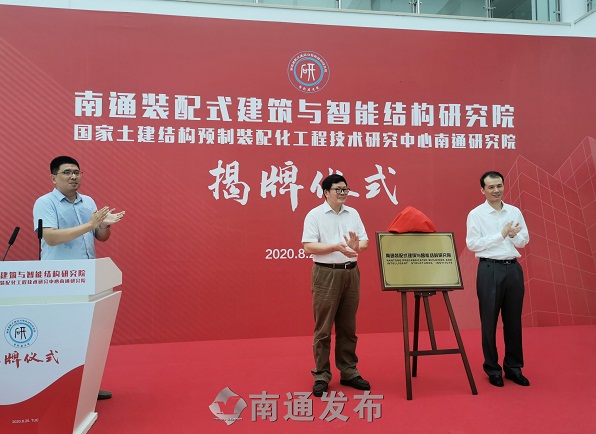Prefabricated construction institute unveiled in Nantong

An unveiling ceremony for the Nantong Research Institute for Prefabricated Buildings and Intelligent Structures is held in the Nantong Central Innovation District on Aug 25. [Photo/ntfabu.com]
The Nantong Research Institute for Prefabricated Buildings and Intelligent Structures and the Nantong branch of the National Engineering Technology Research Center for Prefabrication Construction in Civil Engineering were established in the Nantong Central Innovation District on Aug 25.
The institute is headed by Ou Jinping, an academician of the Chinese Academy of Engineering, and Li Guoqiang, director of the National Engineering Technology Research Center for Prefabrication Construction in Civil Engineering.
It boasts integrated design, automatic manufacturing, digitalized engineering, and intelligent management and aims to become a construction technology innovation center with international clout.
"Nantong is home to a booming construction industry, which is the main reason we decided to establish the institute here," said Gong Hai, director of the Nantong institute. He believes the intelligent prefabricated building industry will grow rapidly thanks to its solid industrial foundation.
According to Gong, the institute plans to formulate several industrial standards for China's prefabricated building sector. It will also host a national industrial summit and exhibition this year, which will feature discussions on the upgrading and integrated development of the country's construction industry.
The Nantong Central Innovation District, dubbed the "new center of Nantong", aims to become a hotbed for sci-tech innovation, finance and trade, and the headquarters economy.
Since it was founded in September 2016, the district has been working to develop intelligent construction, high-end textiles, and new-generation information technology into pillar industries.
So far, the district has attracted more than 120 sci-tech companies and four research institutes.





 TRANSPORTATION
TRANSPORTATION EDUCATION
EDUCATION HEALTHCARE
HEALTHCARE USEFUL NUMBERS
USEFUL NUMBERS